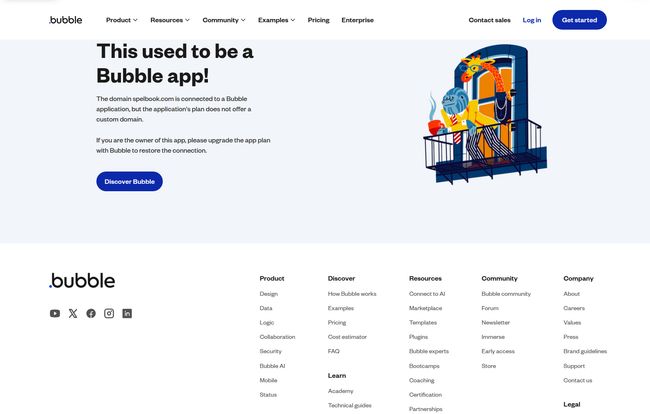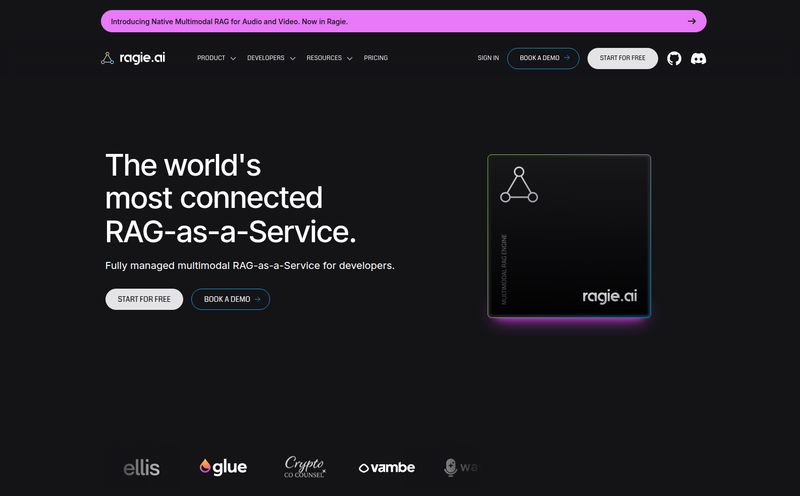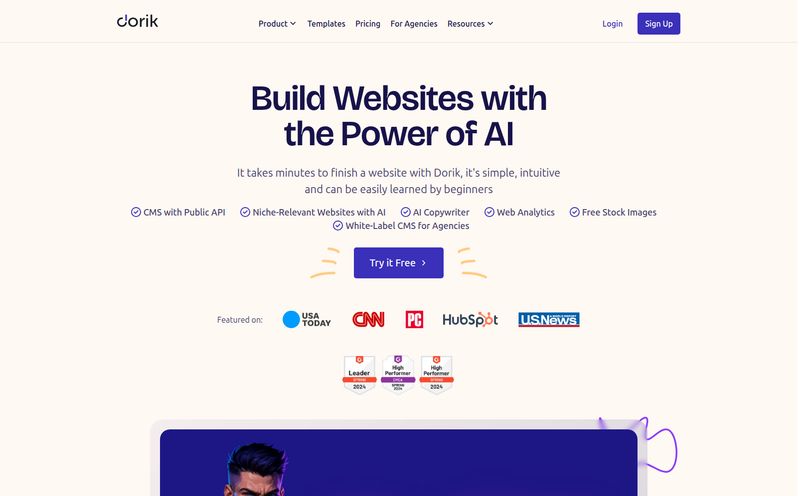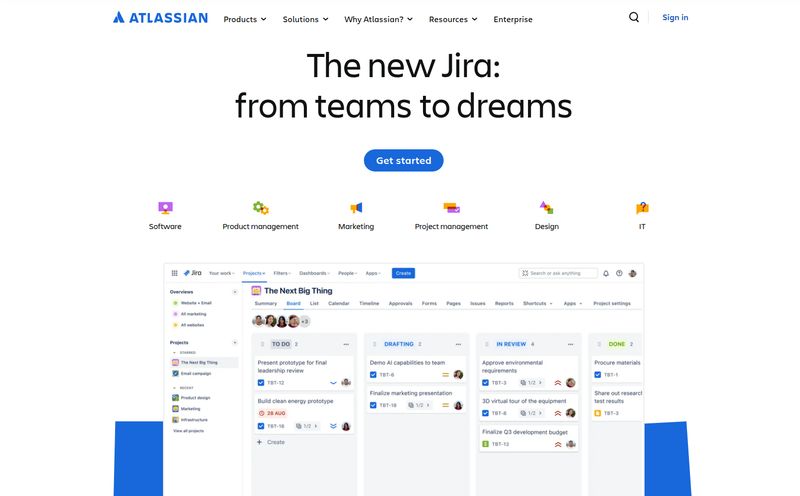You ever stumble upon a tool that seems so perfectly timed, so obviously needed, that you think, “Yes! Finally!”? That was me when I first heard about Spelbook. In the wild west of AI, where we’re all part-time prompt engineers now, the idea of a central, community-driven library for amazing prompts… it’s just a chef’s kiss of an idea.
We’ve all been there. You spend 20 minutes crafting the perfect prompt for ChatGPT or Claude. You get a magnificent, world-class output. You copy-paste it, close the tab, and then... it's gone. Lost to the digital ether, probably hanging out with my missing socks and that one brilliant idea I had in the shower yesterday. We’re hoarding prompts in messy Google Docs, scattered Notion pages, and forgotten text files. It’s a mess. Spelbook was supposed to be the answer. A neat, tidy, shareable solution. So what happened?
What Exactly Was Spelbook Supposed to Be?
At its heart, Spelbook was designed to be a digital grimoire for the modern AI wizard. It was a platform where you could save, organize, and share your most effective AI prompts. Think of it like a GitHub for prompt crafters or a Pinterest for AI creatives. The concept was simple but powerful: stop reinventing the wheel every time you open an AI chat window.
The platform was built on Bubble, a popular no-code platform that allows people to build web applications without writing a single line of code. The core promise was twofold: get your own prompt chaos in order, and tap into the collective genius of a community to discover new, high-performing prompts that others had already tested and approved.
The Allure of a Shared AI Prompt Library
Let's be real, the quality of what you get out of an AI is directly proportional to the quality of what you put in. “Garbage in, garbage out” has never been more true. This is why “prompt engineering” has suddenly become a six-figure skill. A tool like Spelbook taps right into this need.
Organizing Your Digital Brain
I can’t be the only one with a document titled `AI_PROMPTS_FINAL_v2_use_this_one.docx`. The ability to save a prompt, tag it with ‘SEO,’ ‘blogging,’ or ‘social media,’ and maybe even add notes about why it works so well is incredibly appealing. It’s about creating a personal, searchable database of what works. It transforms prompting from a one-off action into a reusable, refinable asset. That’s a big deal for anyone using AI for their job, whether you're a marketer, a developer, or an artist.
The Power of the Crowd
But the real magic, the part that got me excited, was the community angle. Why struggle alone when you can learn from hundreds of others? A community-driven platform means you could find a top-rated prompt for creating a perfect marketing persona, or a clever chain-of-thought prompt for debugging code. It’s a massive shortcut. Instead of spending an hour trying to coax the right tone out of an LLM, you could just find a prompt someone else already perfected. That’s not just a time-saver; it’s a productivity multiplier.
The Elephant in the Room: Where Did Spelbook Go?
This is where our story takes a turn. If you try to visit Spelbook’s website today, you won’t find a bustling community of prompt-sharers. You'll find a digital ghost town. Specifically, you'll land on a generic Bubble page with a rather blunt message:
This used to be a Bubble app!
The domain spelbook.com is connected to a Bubble application, but the application's plan does not offer a custom domain.

Visit Spelbook
Oof. For anyone in the no-code or startup world, that message is painfully clear. It means the owner of the app either downgraded their Bubble subscription to a tier that doesn't support custom domains (like a free plan) or, more likely, stopped paying for it altogether. The lights are on, but nobody's home. The digital landlord has essentially put a lock on the door.
It’s a stark reminder of the fragility of new digital products. An idea is one thing, but execution and, well, paying the bills, is another entirely.
The Pros and (Glaring) Cons of the Spelbook Model
Looking at the ashes, we can still see the blueprint of what could have been a fantastic tool. The concept had some serious strengths.
The idea of a centralized hub? Genius. It solves a real, tangible pain point for a rapidly growing user base. Tapping into community knowledge to find the best prompts is an elegant solution to the quality control problem in AI generation. And building it on a no-code platform like Bubble meant it could be built and launched quickly, testing the market without a massive upfront investment in development. In theory, it was a lean, mean, prompt-sharing machine.
However, the cons became its undoing. The most obvious, in hindsight, is the platform dependency. Building on Bubble is fast, but you're living in their house and playing by their rules. If you can't afford the rent for the features you need—like a custom domain, which is table stakes for any serious project—your project dies. Another challenge for any community platform is the classic chicken-and-egg problem. You need users to provide valuable prompts, but you need valuable prompts to attract users. Getting that flywheel spinning is one of the hardest parts of building a community product. It appears Spelbook might not have gotten it spinning fast enough.
A Cautionary Tale for No-Code Founders
I think the story of Spelbook is more than just a review of a dead tool; it's a valuable lesson for the thousands of entrepreneurs and makers in the no-code space. Your idea can be brilliant, your design can be slick, but you have to have a plan for sustainability.
Did Spelbook have a monetization strategy? Was it going to be a freemium model, a one-time purchase for pro features, or a subscription? Without a clear path to revenue, even a small monthly fee for a platform like Bubble can become an anchor that sinks the whole ship. This is something I see all the time. Founders get so caught up in building the 'thing' that they forget to build the business around the thing.
It's a reminder to think about the boring stuff: business models, user acquisition costs, and your monthly burn rate. No-code lowers the barrier to entry for creating an app, but it doesn't lower the barrier to building a successful business. Spelbook is, for now, a testament to that truth.
What About Spelbook's Pricing?
Unsurprisingly, there’s no pricing information available. Given that it was running on a Bubble plan that couldn’t even support a domain name, it's safe to assume the service was either free during a beta period or the founder was using Bubble's free tier. This often happens with new projects—the founder launches for free to gauge interest and build an initial user base before introducing paid plans. Unfortunately, it seems Spelbook never made it to that next stage.
Frequently Asked Questions
- What was Spelbook?
- Spelbook was a web application designed as a community-driven platform for saving, organizing, sharing, and discovering high-quality AI prompts for tools like ChatGPT, Midjourney, and others.
- Why can't I access Spelbook.com?
- The website currently displays a message from its host, Bubble.io, stating that the application's plan has been downgraded and no longer supports a custom domain. Essentially, the site is inactive.
- Was Spelbook free to use?
- While there's no official pricing page, the evidence suggests it was likely free, at least initially. The platform's inability to maintain a paid Bubble plan points to it not generating revenue.
- Are there any alternatives to Spelbook?
- Yes, absolutely! The need for prompt management is real, and several other tools are in the space. You might check out platforms like PromptBase (a marketplace for prompts), FlowGPT, or even just using a well-organized Notion or Obsidian setup.
- What is Bubble?
- Bubble is a leading no-code development platform that allows people to build and launch custom web applications visually, without needing to write traditional code. It's a popular choice for startups, MVPs, and internal tools.
A Ghost of a Good Idea
So, we pour one out for Spelbook. A genuinely good idea that seems to have stumbled at the finish line. It’s a bummer, really. I would have used it. Many of us would have. But its story is a valuable one. It highlights a real and growing need in the AI space while serving as a potent, real-time case study on the harsh realities of launching a product.
Maybe the founder will see a renewed interest and upgrade their plan. Maybe someone else will pick up the torch. The need for a great AI prompt library isn’t going away, and I, for one, will be watching and waiting for the tool that finally nails it.
References and Sources
- Bubble.io Official Website
- Harvard Business Review - A Guide to Prompt Engineering (For context on the importance of prompts)



